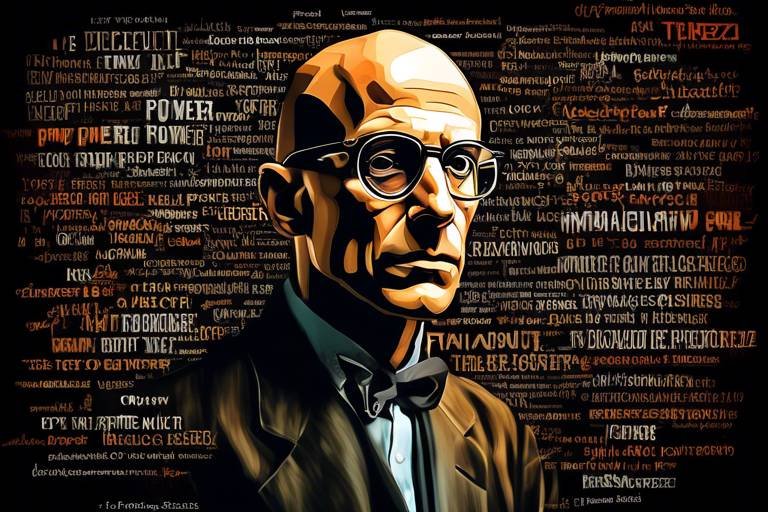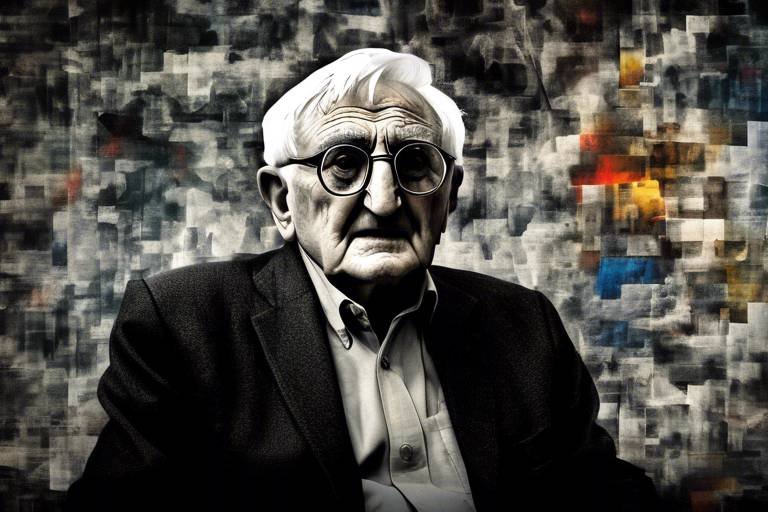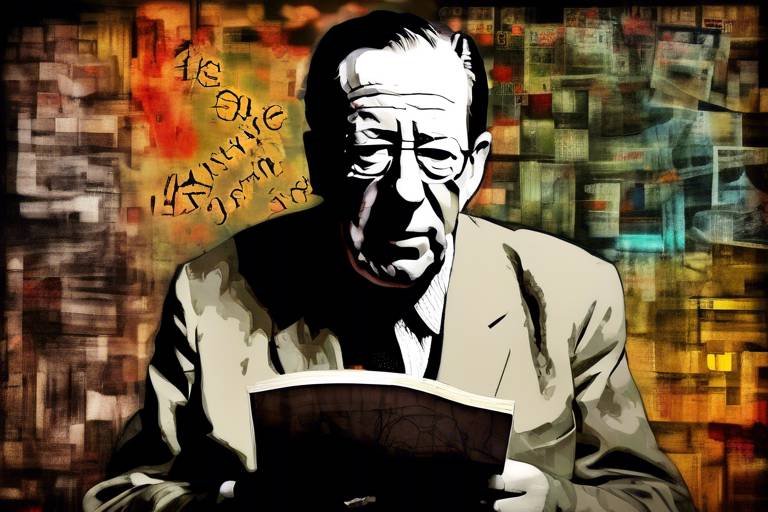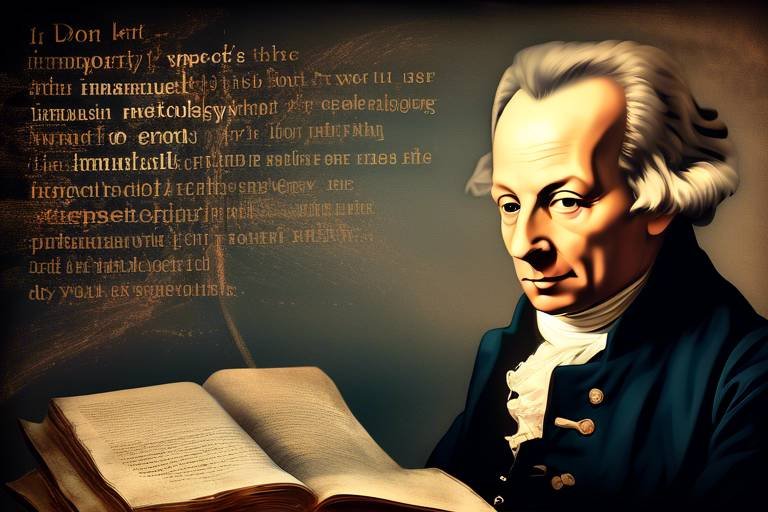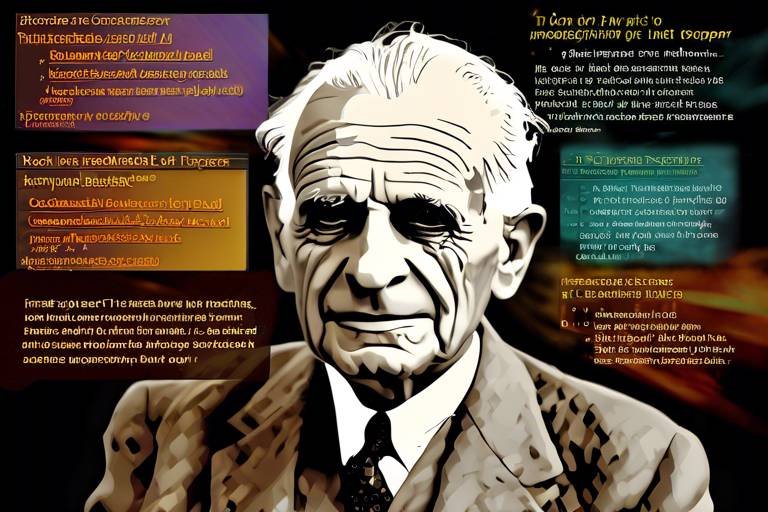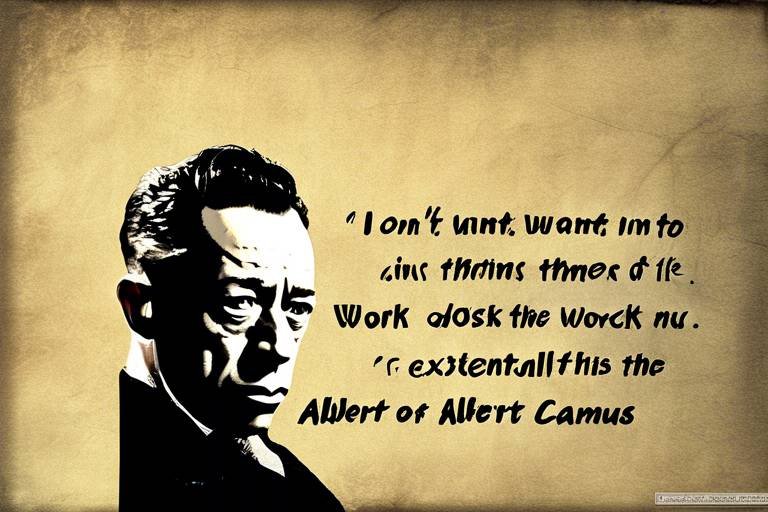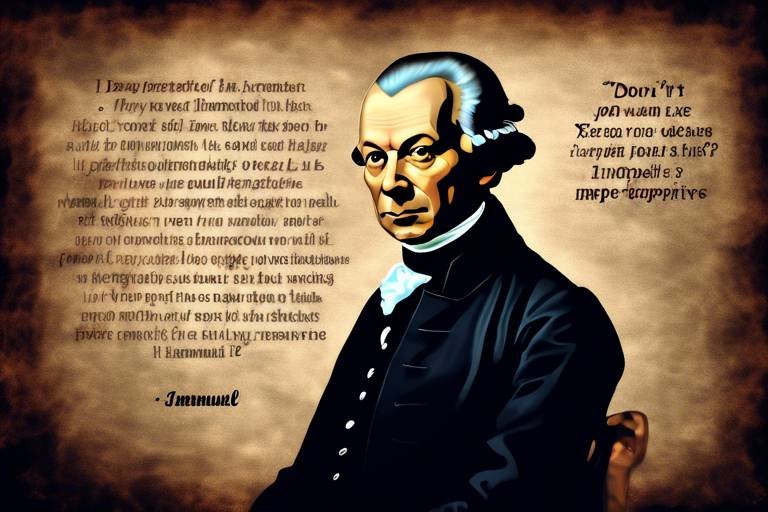How Did Michael Foucault Theorize Power and Knowledge?
Michel Foucault, a French philosopher and social theorist, has profoundly influenced our understanding of the relationship between power and knowledge. His theories challenge traditional views, presenting power not merely as a hierarchical structure imposed from above, but as a complex web of relationships that permeate every facet of society. This perspective invites us to reconsider how knowledge is constructed and disseminated, and how it shapes our behaviors, beliefs, and identities. In this article, we will delve into Foucault's intricate theories, exploring how power operates within social institutions, the role of knowledge as a tool of control, and the potential for resistance against dominant narratives. By examining these themes, we can better understand the implications of Foucault's work for contemporary society and our individual subjectivities.
Foucault's redefinition of power is nothing short of revolutionary. Instead of viewing power as a top-down mechanism wielded by a select few, he presents it as a pervasive force that exists within all social relations. This means that power is not just something that is held; it is something that is exercised through our interactions, institutions, and even our thoughts. Rather than being a repressive force, Foucault suggests that power is productive—it creates realities, shapes norms, and influences behaviors. This perspective shifts our understanding of authority and governance, suggesting that power is everywhere, embedded in the fabric of our daily lives and interactions.
At the heart of Foucault's theories is the notion that power and knowledge are intertwined. He argues that knowledge is not a neutral entity; instead, it is shaped by power dynamics that influence what is accepted as truth. This interplay creates a hierarchy of knowledge where certain perspectives dominate while others are marginalized. Foucault's assertion that "knowledge is power" highlights how knowledge can be used to control and influence societal norms and individual behavior. In this sense, knowledge acts as a tool for governance, shaping our understanding of ourselves and our place within society.
One of Foucault's key contributions to the understanding of power is the concept of disciplinary power. This form of power operates through subtle mechanisms that monitor and regulate individuals, promoting self-discipline and conformity within societal structures. It is not always overt; rather, it often manifests through institutions such as schools, prisons, and hospitals. These institutions employ various techniques of surveillance and normalization to ensure that individuals adhere to societal expectations. The impact of disciplinary power can be profound, as it shapes not only our actions but also our thoughts and identities.
Surveillance is a crucial component of disciplinary power, creating a sense of constant observation that compels individuals to regulate their own actions and thoughts. This phenomenon can be likened to a panopticon, a theoretical prison design proposed by Jeremy Bentham, where inmates are always visible to a central watchtower. The mere possibility of being watched encourages self-regulation and conformity. In contemporary society, surveillance has expanded beyond physical spaces to include digital monitoring, raising questions about privacy, autonomy, and the implications of living in a world where we are perpetually observed.
The process of normalization establishes societal standards that shape individuals' behaviors and identities. It defines what is considered acceptable or deviant, often marginalizing those who do not conform. This normalization is not simply a matter of enforcing rules; it is a pervasive force that influences how we see ourselves and others. Through various cultural and institutional practices, individuals are encouraged to internalize these norms, leading to a collective understanding of what it means to be "normal." The consequences of this process can be significant, as those who deviate from accepted norms often face stigmatization and exclusion.
Another critical aspect of Foucault's theories is the concept of biopower, which refers to the ways in which power governs populations through the regulation of life processes. This form of power focuses on aspects such as health, reproduction, and social welfare, intertwining individual lives with state control. Biopower emphasizes the management of populations, highlighting how governments seek to optimize life and productivity while also exercising control over bodies and behaviors. This intersection of power and biology raises important questions about autonomy, freedom, and the role of the state in our personal lives.
Foucault posited that knowledge is not a neutral or objective entity; instead, it is shaped by the dynamics of power. This perspective challenges the traditional view of knowledge as a straightforward accumulation of facts. Instead, knowledge is constructed through discourses—systems of understanding that define what is considered true or false. These discourses play a significant role in the construction of social realities and power relations, influencing everything from scientific research to cultural narratives. By examining the ways in which knowledge is produced and disseminated, we can uncover the underlying power structures that shape our understanding of the world.
Foucault's exploration of discourses reveals how they define the boundaries of acceptable knowledge and shape our perceptions of truth. These systems of knowledge are not static; they evolve over time, influenced by cultural, political, and social changes. By analyzing the discourses that dominate our society, we can better understand how certain truths are constructed and maintained while others are suppressed. This understanding opens up possibilities for challenging dominant narratives and reimagining what we accept as reality.
Foucault emphasized that where there is power, there is also resistance. This notion highlights the potential for individuals and groups to challenge and subvert dominant power structures. Resistance can take many forms, from overt protests to subtle acts of defiance. Foucault's work encourages us to recognize the power of dissent and the importance of questioning accepted norms and truths. By engaging in acts of resistance, we can disrupt the mechanisms of power that seek to control us and reclaim our agency in the process.
- What is Foucault's main contribution to the study of power?
Foucault redefined power as a pervasive force that operates within social relations rather than a top-down structure, emphasizing its productive nature. - How does Foucault connect power and knowledge?
He argues that power and knowledge are intertwined, with knowledge being shaped by power dynamics and serving as a tool for control. - What is disciplinary power?
Disciplinary power refers to the subtle mechanisms through which individuals are monitored and regulated, promoting self-discipline and conformity. - What is biopower?
Biopower governs populations through the regulation of life processes, focusing on health, reproduction, and social welfare. - How can individuals resist power?
Foucault emphasizes that where there is power, there is resistance, encouraging individuals to challenge and subvert dominant power structures.

Foucault's Concept of Power
Michel Foucault revolutionized our understanding of power by shifting the focus from a traditional, hierarchical view to a more nuanced perspective that sees power as pervasive and dynamic. Instead of viewing power as something wielded by a select few at the top of a social hierarchy, Foucault proposed that power is embedded in everyday interactions and social relations. This means that power is not just about authority or control; it is a network of relationships that influences behavior, shapes knowledge, and ultimately constructs societal norms. For instance, consider how schools, prisons, and hospitals operate not just as institutions of authority but as sites where power circulates, affecting individuals in profound ways.
In Foucault's framework, power is not merely repressive; it is also productive. It creates realities, rituals, and institutions while simultaneously regulating and normalizing behavior. This is where the concept of disciplinary power comes into play. Disciplinary power operates through subtle mechanisms that encourage individuals to monitor themselves and conform to societal expectations. Think about how social media platforms influence our behavior; they create norms for what is considered acceptable or desirable, compelling users to adapt their actions to fit these standards. This self-regulation is a key aspect of Foucault's understanding of power.
Foucault also emphasized that power is not static; it evolves and shifts in response to social changes and contexts. This fluidity means that power can manifest in various forms, from overt coercion to more insidious forms of influence. For example, the way governments implement policies can reflect power dynamics that shape public perception and behavior. These policies often dictate what is considered acceptable knowledge, thus intertwining power with the very fabric of societal understanding.
To illustrate this further, consider the following table that outlines the different dimensions of power as theorized by Foucault:
| Dimension of Power | Description |
|---|---|
| Disciplinary Power | Regulates behavior through surveillance and normalization. |
| Biopower | Governs populations through the regulation of life processes. |
| Institutional Power | Operates within societal institutions, shaping norms and values. |
| Resistance | Emerges wherever power is exercised, creating potential for change. |
In summary, Foucault's concept of power challenges us to rethink how we perceive authority and influence in our lives. By recognizing that power is not merely top-down but rather a complex web of relationships, we can better understand the mechanisms that govern our actions and beliefs. This perspective invites us to critically examine the institutions and norms that shape our realities, ultimately empowering us to question and resist the dominant narratives that often go unchallenged.

The Relationship Between Power and Knowledge
Michel Foucault's examination of the relationship between power and knowledge is nothing short of revolutionary. He posits that these two concepts are not merely linked; rather, they are inextricably intertwined, creating a complex web that shapes our understanding of reality. In Foucault's view, knowledge is not just a collection of facts and figures; it is a powerful tool that can influence societal norms and individual behavior. This notion challenges the traditional belief that knowledge is neutral and objective. Instead, Foucault argues that knowledge is socially constructed, influenced by various power dynamics that govern our lives.
Consider this: every time we accept a piece of information as true, we are also accepting the power structures that have allowed that information to be disseminated. For example, think about how history is taught in schools. The narratives we learn are often curated by those in power, reflecting their perspectives and priorities. This selective presentation of knowledge can reinforce existing hierarchies and marginalize alternative viewpoints. Foucault's theory invites us to question the sources of our knowledge and the motivations behind them.
Foucault introduces the concept of discourses, which are systems of knowledge that define what is considered true or false within a specific context. These discourses shape our understanding of the world and dictate the norms of behavior. For instance, medical discourse not only informs us about health but also establishes what is deemed healthy or sick. The implications are profound: by controlling the discourse, those in power can influence how we perceive ourselves and others, often leading to the normalization of certain behaviors while stigmatizing others.
To illustrate this relationship further, consider the table below, which highlights the interplay between power and knowledge in various societal domains:
| Domain | Power Dynamics | Knowledge Production |
|---|---|---|
| Education | Curriculum design, teacher authority | What is taught and how it is interpreted |
| Health | Medical authority, public health policies | Definition of health standards and practices |
| Politics | Government regulations, media control | Framing of political narratives and public opinion |
In these examples, we see how knowledge is shaped by those who hold power, creating a feedback loop that reinforces their authority. This dynamic is not static; it evolves as societal norms change and new discourses emerge. Foucault's insights compel us to recognize that knowledge is not just a passive reflection of reality but an active force that can be wielded to maintain or challenge power structures.
Moreover, Foucault emphasizes that with power comes the potential for resistance. Where there is power, there are also opportunities for individuals and groups to challenge the status quo. This resistance can take many forms, from grassroots movements to academic critiques, all aimed at disrupting the dominant narratives that shape our understanding of the world. By recognizing the relationship between power and knowledge, we empower ourselves to question, critique, and ultimately reshape the narratives that govern our lives.
- What is Foucault's main argument about power and knowledge?
Foucault argues that power and knowledge are intertwined, with knowledge serving as a tool of power that shapes societal norms and individual behavior. - How does Foucault define discourse?
Discourse refers to systems of knowledge that define what is considered true or false, influencing how we understand and interact with the world. - Can individuals resist power structures according to Foucault?
Yes, Foucault emphasizes that where there is power, there is also the potential for resistance, allowing individuals and groups to challenge dominant narratives.

Disciplinary Power
When we think about power, we often picture a grand figure sitting on a throne, issuing commands from above. However, Michel Foucault invites us to look beyond this traditional view and consider a more nuanced understanding of power—one that operates subtly within the fabric of society. Disciplinary power, as Foucault describes it, is not about overt domination; rather, it is about the myriad ways individuals are monitored and regulated in their daily lives. This form of power is embedded in institutions such as schools, prisons, and hospitals, where rules and norms subtly shape our behavior and thoughts.
Imagine walking into a classroom where the teacher's gaze seems to linger on you just a bit longer than the others. This feeling of being watched can trigger a response; you might sit up straighter, pay closer attention, or even suppress a yawn. This is the essence of disciplinary power—it encourages self-regulation and conformity through the awareness of surveillance. In this way, individuals internalize societal expectations, leading to a kind of self-discipline that aligns with the norms dictated by those in power.
Surveillance is a key mechanism of disciplinary power. It creates a sense of constant observation, compelling individuals to monitor their own actions and thoughts. This is not limited to physical observation; it extends to various forms of media and technology that track our behaviors, from social media interactions to fitness apps. The result? A society where individuals feel the pressure to conform, often leading to a homogenization of behaviors and attitudes.
Foucault also introduces the concept of normalization, which refers to how societal standards are established and enforced. Through normalization, certain behaviors and identities are deemed acceptable, while others are marginalized. For example, consider the societal expectations surrounding body image. The idealized standards promoted through media can lead individuals to alter their behaviors, striving to fit into a narrow definition of beauty. Those who deviate from these norms often find themselves sidelined or stigmatized, illustrating the powerful influence of disciplinary power on personal identity.
Ultimately, disciplinary power shapes our realities in profound ways, often without us even realizing it. It operates through a complex web of social relations, subtly guiding us to conform while simultaneously providing the illusion of choice. As we navigate our lives, it’s essential to recognize these influences and consider how they shape our understanding of ourselves and our place within society.

Surveillance and Control
Surveillance and control are at the heart of Michel Foucault's theory of disciplinary power. In our modern society, the concept of being watched is no longer just a notion; it has become a reality that permeates every aspect of our lives. Think about it: from the moment we wake up and check our phones to the time we go to bed, we are constantly being monitored. This continuous observation creates a sense of self-regulation among individuals, compelling them to conform to societal expectations and norms. But how does this actually work?
Foucault argued that surveillance operates not just through overt means, like cameras or security personnel, but also through subtle social mechanisms that influence our behaviors and thoughts. It’s like a game of chess where every move is being scrutinized, and the fear of being checked makes players think twice before they act. This idea of being under constant watch leads to what Foucault termed a "panopticism," a concept derived from Jeremy Bentham's Panopticon—a circular prison design where inmates are always visible to a central watchtower. The very possibility of being observed forces individuals to modify their behavior, leading to a form of internalized discipline.
Moreover, surveillance fosters a culture of compliance, where individuals feel pressured to adhere to societal norms. This can manifest in various ways, such as:
- Social media platforms tracking our online behavior and preferences, shaping our interactions.
- Workplaces monitoring employee productivity, creating an atmosphere of constant evaluation.
- Government surveillance programs that keep tabs on citizens under the guise of national security.
These examples illustrate how surveillance extends beyond mere observation; it becomes an integral part of our lives, subtly guiding our actions and thoughts. In essence, surveillance is not just about watching; it’s about creating a reality where individuals feel compelled to behave in certain ways. This is where the concept of control comes into play. Control is exercised not only through direct intervention but also through the establishment of norms that dictate acceptable behavior. When people internalize these norms, they become their own overseers, leading to a society where conformity is the expected standard.
Foucault's insights into surveillance and control remind us that power is not always visible or authoritarian. Instead, it can be insidious, operating through systems that shape our perceptions and actions without us even realizing it. The challenge lies in recognizing these dynamics and understanding how they influence our lives. Are we truly free, or are we merely conforming to a set of expectations shaped by unseen forces?
- What is Foucault's concept of surveillance?
Foucault's concept of surveillance refers to the mechanisms through which individuals are monitored and regulated, leading to self-discipline and conformity. - How does surveillance affect individual behavior?
Surveillance creates a sense of constant observation, compelling individuals to regulate their own actions and thoughts to fit societal norms. - What is panopticism?
Panopticism is a concept derived from the Panopticon prison design, emphasizing how the possibility of being observed leads to self-regulation among individuals. - Can individuals resist surveillance?
Yes, Foucault emphasized that where there is power, there is also resistance, highlighting the potential for individuals to challenge and subvert dominant power structures.

Normalization
Normalization is a fascinating yet often insidious process that shapes our behaviors and identities in profound ways. At its core, normalization involves the establishment of societal standards that dictate what is considered "normal" or acceptable within a given context. This process is not merely a passive observation of behaviors; rather, it actively constructs the framework within which individuals operate. Think of it as a set of unwritten rules that govern our actions, thoughts, and even our aspirations. It’s like a game where the rules are set by those in power, and if you don’t play by them, you risk being sidelined or marginalized.
One of the key aspects of normalization is that it often operates subtly, infiltrating various facets of our lives without us even realizing it. For instance, consider how societal norms influence our choices in fashion, career paths, or even relationships. The pressure to conform can be overwhelming, leading individuals to internalize these norms and adjust their behaviors accordingly. This self-regulation is a direct result of the normalization process, where the fear of being judged or ostracized compels us to fit into predefined molds.
Moreover, normalization can create hierarchies within society, privileging certain identities and experiences while marginalizing others. Those who deviate from the norm—whether due to their race, gender, sexual orientation, or any other characteristic—often find themselves on the fringes, facing discrimination or exclusion. This marginalization is not just a byproduct of societal attitudes; it is a systematic outcome of normalization, which enforces conformity and punishes deviation.
To illustrate this concept further, let’s consider a few examples of normalization in action:
- Education: In educational settings, students are often expected to adhere to specific behavioral norms. Those who do not conform may face disciplinary actions or social ostracism.
- Health: The normalization of certain health standards can lead to stigmatization of individuals who do not fit these ideals, such as those with disabilities or chronic illnesses.
- Social Media: Platforms like Instagram or TikTok often propagate a narrow definition of beauty and success, influencing users to conform to these ideals or face backlash.
Ultimately, normalization serves as a powerful mechanism through which societies enforce compliance and maintain order. By establishing what is deemed acceptable, it not only shapes individual identities but also reinforces existing power structures. Understanding the dynamics of normalization is crucial for recognizing how deeply ingrained societal norms influence our lives, often without our conscious awareness. It prompts us to question: Are we truly free to be ourselves, or are we merely reflections of the norms imposed upon us?
- What is normalization in Foucault's theory?
Normalization refers to the process by which societal standards are established, shaping individuals' behaviors and identities to fit within accepted norms. - How does normalization affect individual identity?
Normalization can lead to self-regulation, compelling individuals to conform to societal expectations, which may marginalize those who deviate from the norm. - Can normalization be resisted?
Yes, Foucault emphasized that where there is power, there is also resistance. Individuals and groups can challenge and subvert dominant norms through various forms of dissent.

Biopower
Biopower is a fascinating concept introduced by Michel Foucault that delves into how modern states exert control over populations through the regulation of life itself. Unlike traditional forms of power that might rely on overt coercion or violence, biopower operates more subtly, influencing aspects of our daily lives such as health, reproduction, and social welfare. Imagine a puppet master not pulling strings in a dramatic fashion but rather guiding the puppets through the very fabric of their existence, shaping their choices and behaviors without them even realizing it. This kind of power is pervasive, infiltrating the most intimate aspects of our lives.
Foucault argued that biopower is fundamentally about managing life—it's about making sure that individuals not only live but thrive within certain parameters defined by the state. It creates a framework where the state monitors and regulates populations, often through institutions like healthcare, education, and welfare systems. For example, when governments implement public health policies, they are not just concerned with individual health; they are also managing the health of the population as a whole. This can lead to a paradox where the very systems meant to protect us can also serve as mechanisms of control.
In essence, biopower intertwines individual lives with state interests, creating a complex web of dependencies. It raises critical questions about autonomy and freedom: to what extent are we really making our own choices? Are our decisions influenced by societal norms and regulations that have been established by those in power? This interplay between individual agency and state control can be likened to a dance, where both partners must move in sync, yet one often leads the other.
Moreover, biopower operates through various societal institutions, which can be categorized into several key areas:
- Healthcare: The regulation of health standards, medical practices, and the promotion of public health initiatives.
- Education: The shaping of knowledge and norms through educational systems that dictate what is deemed acceptable or valuable.
- Reproductive Rights: Control over reproductive choices and policies that govern family planning and childbirth.
- Social Welfare: Programs designed to support individuals, which can also enforce compliance with societal norms.
The implications of biopower are profound. It challenges us to rethink our understanding of freedom and autonomy in a world where our lives are constantly being shaped by the forces of governance. In many ways, it highlights the paradox of living in a society that promises individual freedom while simultaneously regulating the very essence of our existence. As we navigate through these complexities, we must remain vigilant and aware of how these dynamics play out in our everyday lives.

Knowledge as a Tool of Power
When we think about knowledge, we often perceive it as a neutral entity, a mere collection of facts and truths waiting to be discovered. However, Michel Foucault shakes this notion to its core by asserting that knowledge is anything but neutral; it is, in fact, a powerful tool wielded by those in authority. This perspective transforms our understanding of knowledge from a simple academic pursuit to a dynamic force that shapes societal structures and individual behaviors. Foucault argues that knowledge is deeply intertwined with power, suggesting that what we accept as truth is often dictated by the prevailing power dynamics. This means that the knowledge we consume and produce is not just a reflection of reality but is also a means of establishing control over individuals and populations.
To illustrate this point, consider how certain disciplines, such as psychology, medicine, and education, have historically defined norms and standards that dictate what is considered "normal" or "acceptable" behavior. These disciplines create discourses—systems of knowledge that shape our understanding of reality. For instance, the medical field has the authority to classify certain behaviors as illnesses, thereby exerting control over individuals by defining what is healthy or unhealthy. This classification not only influences treatment options but also impacts how society views those diagnosed with mental health conditions. In this way, knowledge becomes a mechanism of power that can marginalize, stigmatize, or empower individuals.
Furthermore, Foucault emphasizes that knowledge is not just about what is known but also about who gets to define what is known. The hierarchies of knowledge that exist within society often privilege certain perspectives over others, leading to a skewed understanding of truth. For example, the voices of marginalized communities are frequently overlooked in mainstream discourses, resulting in a narrow interpretation of reality that fails to encompass diverse experiences. This disparity highlights the need for critical engagement with the sources of knowledge we consume and the power structures that influence them. By recognizing the biases inherent in knowledge production, we can begin to challenge these dominant narratives and advocate for a more inclusive understanding of truth.
Ultimately, Foucault's insights compel us to reconsider the relationship between knowledge and power. Rather than viewing knowledge as a static resource, we must see it as a dynamic force that shapes our lives and societies. Whether it's through educational systems, media representation, or institutional policies, knowledge plays a crucial role in the governance of individuals and populations. As we navigate this complex landscape, it is essential to remain vigilant about the power dynamics at play in the production and dissemination of knowledge. Only by doing so can we begin to dismantle the structures that perpetuate inequality and strive for a more equitable society.
- What does Foucault mean by knowledge being a tool of power?
Foucault argues that knowledge is not neutral; it is shaped by power relations and can be used to control and influence societal norms and individual behaviors. - How do discourses influence our perception of truth?
Discourses are systems of knowledge that define what is considered true or false, playing a significant role in the construction of social realities and power relations. - Can individuals resist the power of knowledge?
Yes, Foucault emphasizes that where there is power, there is also resistance, highlighting the potential for individuals and groups to challenge dominant power structures.

Discourses and Truth
When we dive into Michel Foucault's theories, we quickly realize that the concept of discourses is central to understanding how knowledge and power interplay in our society. Discourses are not just mere conversations or narratives; they are structured ways of thinking and speaking that define what is accepted as true or false at any given moment. Think of it this way: discourses act like the lens through which we view the world. They shape our perceptions, influence our beliefs, and ultimately, guide our actions.
Foucault argues that these discourses are deeply embedded in power relations. They arise from specific historical contexts and are maintained through various social practices. For instance, the discourse around mental health has evolved dramatically over the years. In earlier centuries, individuals with mental health issues were often labeled as "mad" and subjected to cruel treatments. However, as our understanding of psychology progressed, the discourse shifted to one that emphasizes care and understanding. This transformation illustrates how discourses can reflect the power dynamics of their time.
Moreover, discourses create truth regimes, which are the accepted norms and beliefs that govern our understanding of reality. These regimes are not static; they change as societal values and power structures evolve. For example, consider the discourse surrounding gender identity. In recent times, there has been a significant shift towards recognizing and validating diverse gender identities, challenging traditional binary notions. This shift is indicative of a broader societal change in how we perceive identity, power, and the truth about ourselves.
To illustrate the relationship between discourses and truth, we can look at a simple table that outlines some key aspects:
| Aspect | Discourses | Truth |
|---|---|---|
| Definition | Structured ways of thinking and speaking | Accepted norms and beliefs |
| Influence | Shapes perceptions and guides actions | Determines what is seen as reality |
| Changeability | Evolves with societal values | Can shift over time |
Foucault also emphasizes that knowledge is power, and this power is exercised through the production and dissemination of discourses. Those who control the discourses often dictate what is considered truth, thus reinforcing their position within the social hierarchy. This creates a cycle where knowledge, shaped by power, in turn, legitimizes that power. It's a fascinating, albeit complex, dance that plays out in our everyday lives.
Ultimately, understanding the dynamics of discourses and truth allows us to critically engage with the world around us. It encourages us to question the narratives we encounter, to seek out alternative perspectives, and to recognize the power structures at play. By doing so, we can empower ourselves and others to challenge dominant discourses and carve out spaces for new truths to emerge.
- What are discourses in Foucault's theory? Discourses are structured systems of knowledge that define what is considered true or false, influencing societal norms and individual behavior.
- How do discourses shape our understanding of truth? They create frameworks that dictate accepted norms and beliefs, which can evolve over time with changing societal values.
- Why is it important to question dominant discourses? Questioning dominant discourses allows individuals to challenge power structures and advocate for alternative perspectives, fostering a more inclusive understanding of truth.

Resistance to Power
Michel Foucault's exploration of power dynamics is not just a tale of control and domination; it's also a narrative rich with the potential for resistance. He famously asserted that "where there is power, there is resistance," which suggests that power is not a monolithic force. Instead, it’s a complex web of relationships that opens up spaces for dissent and challenge. Think of power like a game of chess—every move made by one player creates an opportunity for the other to counteract. In this sense, individuals and groups are not merely passive recipients of power; they are active agents capable of resisting and reshaping the very structures that seek to control them.
Resistance can take many forms, from overt protests and social movements to subtle acts of defiance and personal choices. For instance, consider the rise of social media as a platform for marginalized voices. In the past, those who were oppressed often found it difficult to speak out and organize. However, with the advent of digital communication, individuals can now share their stories, mobilize communities, and challenge dominant narratives with unprecedented speed and reach. This is a prime example of how technology can empower resistance, allowing people to reclaim their voices in a world where power often seeks to silence them.
Foucault also emphasized that resistance is not just about opposing power; it's about redefining what power means in the first place. This can involve creating alternative discourses that challenge the accepted truths upheld by dominant institutions. For example, movements advocating for gender equality or racial justice often seek to dismantle the prevailing narratives that perpetuate inequality. By introducing new ideas and frameworks, these movements can shift public perception and policy, illustrating how resistance can lead to profound societal change.
Moreover, resistance is often a collective endeavor. When individuals unite around a common cause, their combined strength can challenge even the most entrenched power structures. Historical examples abound, from the civil rights movement in the United States to the anti-apartheid struggle in South Africa. In each case, grassroots activism, community organizing, and solidarity played crucial roles in resisting oppression and fostering change. Foucault's insights remind us that while power may be pervasive, so too is the potential for collective action and resistance.
In summary, Foucault's theories on resistance shed light on the dynamic interplay between power and agency. They encourage us to recognize our capacity to resist and reshape the world around us. Whether through personal choices or collective action, the potential for resistance exists within each of us, waiting to be harnessed.
- What is Foucault's view on power? Foucault sees power as a pervasive force that operates through social relations and institutions rather than a top-down structure.
- How does resistance manifest in society? Resistance can take various forms, including protests, social movements, and individual acts of defiance.
- Can knowledge be a form of power? Yes, Foucault argues that knowledge is shaped by power dynamics and can influence societal norms and individual behavior.
- What role does surveillance play in power dynamics? Surveillance creates a sense of constant observation, compelling individuals to regulate their own actions and thoughts, leading to self-discipline.
Frequently Asked Questions
- What is Michel Foucault's view on power?
Michel Foucault redefined power as a complex, pervasive force that operates through social relations rather than just a top-down structure. He believed that power is everywhere, influencing behavior and shaping knowledge in subtle yet profound ways.
- How does Foucault connect power and knowledge?
Foucault argued that power and knowledge are deeply intertwined. He suggested that knowledge is not neutral; instead, it is a form of power that can influence societal norms and individual behaviors. In essence, what we accept as "truth" is often shaped by power dynamics.
- What is disciplinary power according to Foucault?
Disciplinary power refers to the mechanisms used to monitor and regulate individuals, leading to self-discipline and conformity. It works subtly through institutions and social norms, compelling people to align their behaviors with societal expectations.
- How does surveillance play a role in Foucault's theories?
Surveillance is a critical aspect of disciplinary power. It creates a sense of constant observation, which pushes individuals to regulate their own actions and thoughts, often leading to internalized control and conformity to societal norms.
- What is normalization in Foucault's theory?
Normalization is the process by which societal standards are established, influencing how individuals behave and identify themselves. This often marginalizes those who do not conform to these accepted norms, reinforcing power structures within society.
- Can you explain biopower?
Biopower is a form of power that governs populations by regulating life processes, such as health and reproduction. It intertwines individual lives with state control, focusing on aspects of social welfare and the management of populations.
- What are discourses in Foucault's framework?
Discourses are systems of knowledge that define what is considered true or false. They play a significant role in shaping social realities and power relations, influencing how individuals understand and interact with the world around them.
- Is there room for resistance in Foucault's theory?
Absolutely! Foucault emphasized that where there is power, there is also resistance. He highlighted the potential for individuals and groups to challenge and subvert dominant power structures through various forms of dissent and activism.

